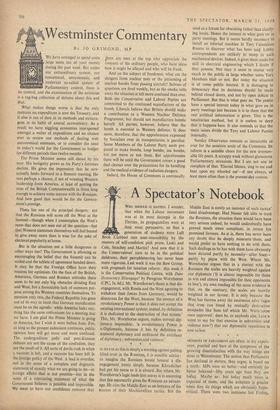i t ,,Westminster Commentary BY JO GRIMOND, MP WE have arranged to
spend some large sums out of your money 11 • !! during the past week. But under our extraordinary system, our nonsensical, unsystematic and What makes things worse is that the only restraint on expenditure is now the Treasury, and it also is out of date in its methods and extrava- gant in its habit of annual accountancy. As a result we have niggling economies interspersed amongst a welter of expenditure and no chance ever to review our methods of dealing with astronomical estimates, or to consider the need in today's world for the Government to budget for different periods than twelve months.
The Prime Minister seems still elated by his tour. His benignity grows as his Party's fortunes decline. He gives the impression that he now actually looks forward to a Summit meeting. He sees perhaps a chance, if not of wresting Western leadership from America, at least of putting the nose of the British Commonwealth in front long enough to achieve some success with the Russians. And how good that would be for the Govern- ment's prestige.
There lies one of the principal dangers: not that the Russians will score off the West at the Summit—though when I contemplate the West's team that does not seen out of the question—but that Western statesmen themselves will feel bound to give away more than is wise for the sake of electoral popularity at home.
But is the situation not a little dangerous in other ways too? The Government is allowing or encouraging the belief that the Summit can be scaled and the tablets of agreement handed down. It may be that the Foreign Office have their reasons for optimism. On the face of the British, American, German and Russian attitudes there seem to be not only big obstacles dividing East and West, but a formidable lack of common pur- pose among the Western countries themselves. To mention only two, the Federal Republic has.gone out of its way to insist that German reunification must be on the agenda : while America lacks any- thing like the same enthusiasm for a meeting that we have. I am glad the Prime Minister is going to America, but I wish it were before June. For, as long as the present indecision continues, public opinion here will get more and more confused. The undergraduate polls and post-Kennan debates are not the cause of the confusion; they are the result of it. All sorts of devils rush in when a vacuum is left, and a vacuum has been left in the foreign policy of the West. A lead is overdue, not in the sense of a complete and dogmatic statement of exactly what we are going to do—in foreign affairs that is not possible—but in the sense of a convincing statement of what the Government believes is possible and impossible. We want to have our confidence restored that ,here are men at the top who appreciate the concern of the ordinary people, who have ideas how it might be allayed and who will be frank.
And on the subject of frankness, what are the dangers from nuclear tests or the jettisoning of nuclear bombs from passing aircraft? Salvoes of questions are fired weekly, but as the smoke rolls away the situation is left more confused than ever. Both the Conservative and Labour Papies are committed to the continued manufacture of the bomb. Liberals believe that Britain should make a contribution to a Western Nuclear Defence Programme, but should not manufacture bombs herself. All parties, however, believe that the bomb is essential to Western defence. It does seem, therefore, that the apprehension expressed by Socialists over its transportation is peculiar. Some Members of the Labour Party seem pre- pared to make bombs, keep bombs, use bombs, but not move or test them. But apprehension there will be until the Government comes a good deal cleaner over the precautions for its handling and the medical evidence of radiation dangers.
Indeed, the House of Commons is continually used as a forum for obscuring rather than clarify- ing issues. Hence the interest in what goes on in party meetings. But it seems hardly necessary to install an infernal machine in Tory Committee Rooms to discover what has been said. Lobby correspondents are unlikely to stoop to such mechanical devices. Indeed, it gives them credit for skill in electrical engineering which I doubt if they possess. Nor may it seem to matter very much to the public at large whether some Tory Members blab or not. But today the situation is of some public interest. It is damaging to democracy that its decisions should be made behind closed doors, and not by open debate in Parliament. But that is what goes on. The public have a special interest today in what goes on in party meetings just because it is to them that the real political information is given. This is the totalitarian method, but it is useless to deny that it happens here. It also reminds us that the main issues divide the Tory and Labour Parties internally.
Sunday Observance remains as intractable as ever for the sensitive souls of the Commons. Its reform is a suitable chore for the new irremov- able life peers. A scrappy week without glamorous Parliamentary occasions. But I am not one to complain of that. `Elected Silence, sing to me and beat upon my whorled ear'—if not always, at least more often than is the present-day custom.


































 Previous page
Previous page